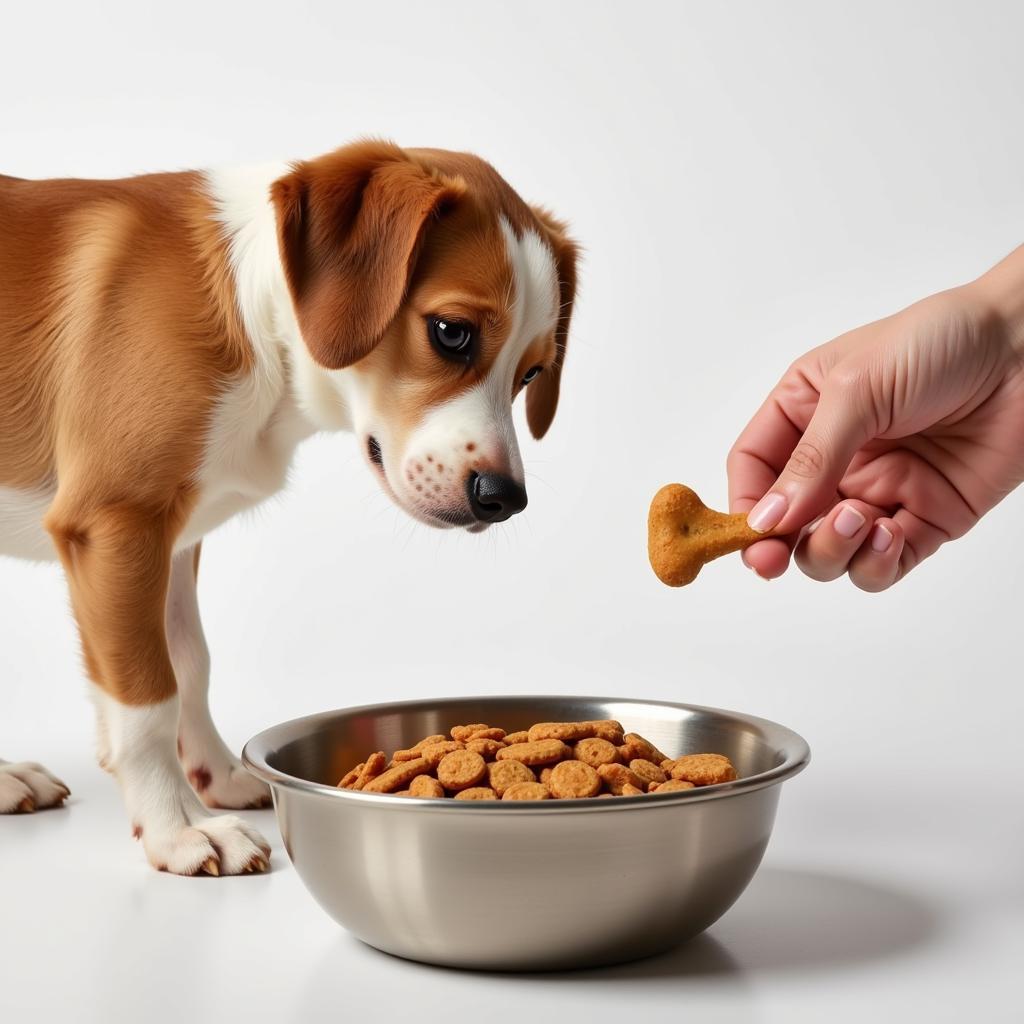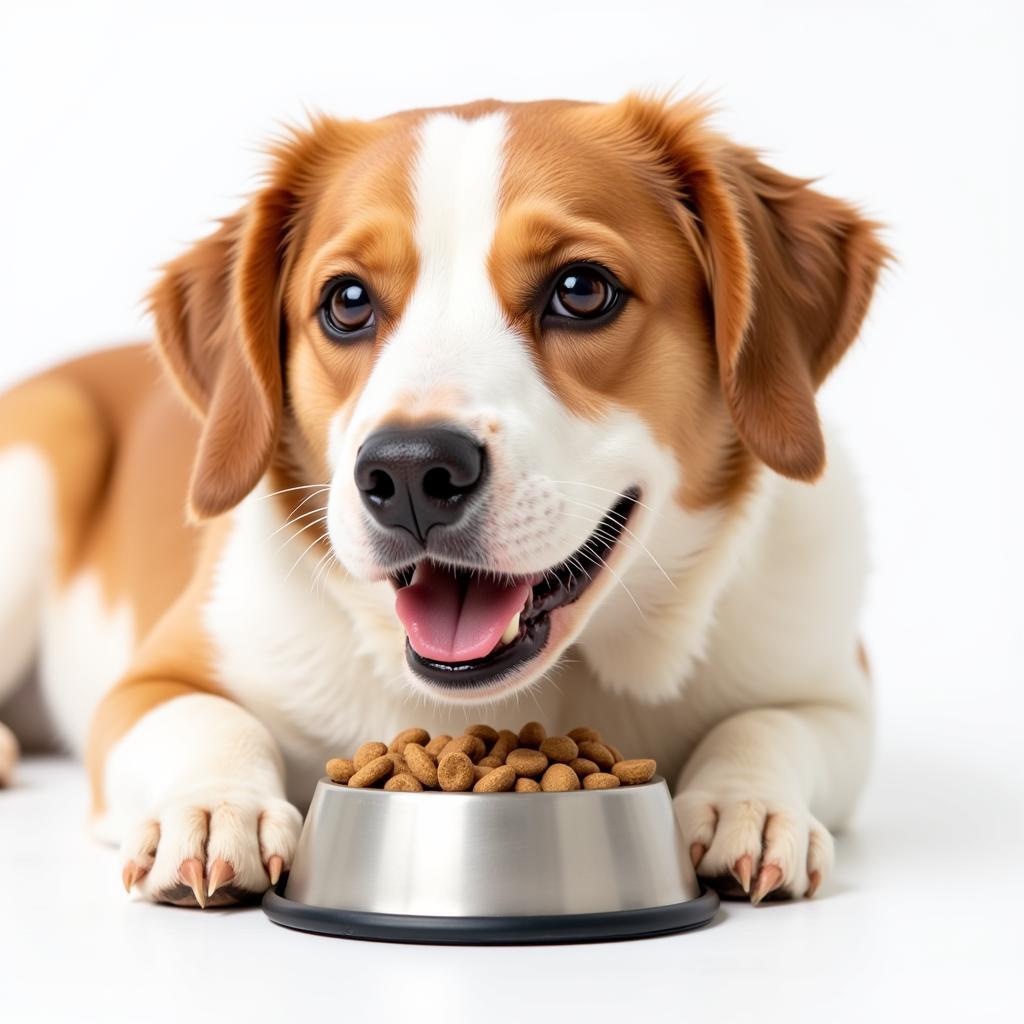Your dog refuses their kibble but happily gobbles down treats? This is a common scenario that many dog owners face, and it can be frustrating. Understanding why your Dog Will Not Eat Dog Food But Will Eat Treats is the first step to resolving this picky eating habit.
Understanding the Picky Eater: Why Your Dog Prefers Treats
There are several reasons why your dog might be turning their nose up at their regular food. One of the most obvious culprits is palatability. Treats are often designed to be more appealing than regular dog food, with richer flavors and enticing aromas. Your dog, quite simply, might just find their treats more delicious! Another factor to consider is spoiling. If your dog frequently receives treats, they may start holding out for these tastier morsels, learning that if they refuse their kibble long enough, a treat will eventually appear. This learned behavior can be tricky to break. Lastly, medical reasons can sometimes contribute to appetite changes. While less common, it’s essential to rule out any underlying health issues that might be affecting your dog’s eating habits.
 Dog refusing kibble, preferring treats
Dog refusing kibble, preferring treats
Breaking the Cycle: How to Get Your Dog Back on Their Food
So, what can you do if your dog will not eat dog food but will eat treats? The first step is to establish a consistent feeding schedule. Feed your dog at the same times each day and remove the food bowl after 20-30 minutes, regardless of whether they’ve eaten. This helps create a sense of routine and prevents grazing. Next, gradually reduce the number of treats you give your dog. While treats are a valuable tool for training and bonding, over-treating can lead to picky eating. Consider using a portion of their kibble as training rewards instead. Another helpful tip is to make their kibble more appealing. Try mixing in a small amount of warm water or low-sodium broth to soften the food and enhance the aroma. You can also add a spoonful of plain, unsweetened yogurt or a sprinkle of dog-safe herbs, like parsley or basil.
 Dog eating kibble from bowl
Dog eating kibble from bowl
Medical Considerations: When to Consult a Vet
While picky eating is often a behavioral issue, it’s important to be aware of potential medical causes. If your dog’s appetite changes suddenly or drastically, or if they exhibit other symptoms like lethargy, vomiting, or diarrhea, consult your veterinarian immediately. These symptoms could indicate an underlying health problem that requires professional attention. Dr. Emily Carter, DVM, advises, “A sudden change in eating habits can be a red flag. It’s always best to err on the side of caution and consult a veterinarian to rule out any underlying medical conditions.”
Transitioning to New Food: A Gradual Approach
If you’re switching your dog to a new type of dog food, do it gradually over several days. Start by mixing a small amount of the new food with their current food, slowly increasing the proportion of new food over time. This helps your dog adjust to the new taste and texture and minimizes the risk of digestive upset. Dr. Robert Miller, DVM, suggests, “A gradual transition minimizes stress and helps ensure your dog accepts the new food without issue.”
Conclusion: Patience and Consistency are Key
Dealing with a picky eater can be challenging, but with patience and consistency, you can help your dog develop healthier eating habits. Remember to address both behavioral and potential medical factors, and don’t hesitate to seek professional advice from your veterinarian or a certified dog trainer if needed. By understanding why your dog will not eat dog food but will eat treats, you can take the necessary steps to ensure they receive the proper nutrition for a happy and healthy life.
FAQ
- Is it okay to mix treats with my dog’s food? While this might encourage them to eat in the short term, it can reinforce picky eating habits in the long run.
- What if my dog still refuses to eat their kibble? Consult your veterinarian or a certified dog trainer for personalized advice.
- Can I try adding human food to my dog’s kibble? Some human foods are safe and even beneficial for dogs, but always consult your veterinarian before making any dietary changes.
- How long should I wait before taking my dog to the vet if they’re not eating? If your dog goes more than 24 hours without eating, consult your veterinarian.
- Are certain breeds more prone to picky eating? While any dog can become a picky eater, some breeds are known to be more selective about their food.
Need Help? Contact us at Phone Number: 02437655121, Email: minacones@gmail.com Or visit us at: 3PGH+8R9, ĐT70A, thôn Trung, Bắc Từ Liêm, Hà Nội, Việt Nam. We have a 24/7 customer support team.